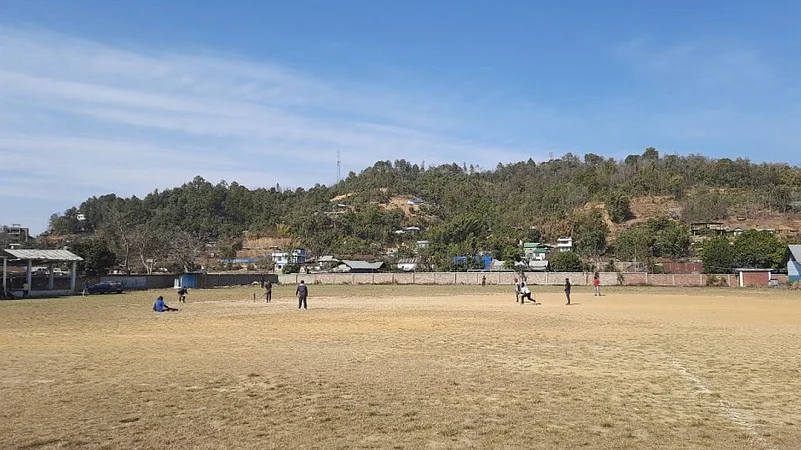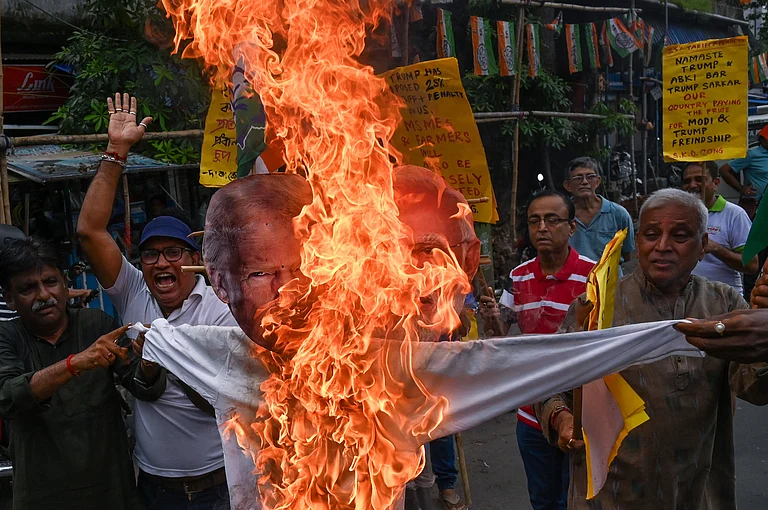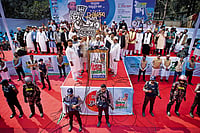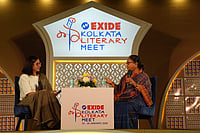Distributing cash or alcohol ahead of elections is no new practice in India for ‘buying’ votes but tea fannings and sugar for a month?
“Burmese tea and sugar,” said Mangboi Kipgen, resident of Govajang, a small, hilly and impoverished Kuki village along India’s unfenced border with Myanmar in Tengnoupal constituency in the eponymous district in Manipur, when asked if any party came to campaign in their village for the assembly elections.
Only the Bharatiya Janata Party (BJP)’s local workers came and gave tea fannings and sugar for a month to every family, Kipgen said.
Tegnoupal is among the 20 constituencies in the hills districts that will vote in the second of the two-phase assembly election, on March 5. As of February 26, there was no sign of any electoral campaign in the Kuki tribe-dominated Govajang, just like several other villages on the hills in this remote
constituency.
The villagers need, above everything else, roads and mobile networks. “Indian networks do not work here. We use Burmese (Myanmar’s) SIM cards when at home and Indian SIMs when outside the village,” said Thangmang Haokip, secretary of the village welfare committee.
However, they could not place their demand when BJP workers came seeking votes. No one asked them what they needed.
Kipgen and Haokip were content with the fact that these demands are not part of their electoral bargains. Kuki leaders of higher standing – including insurgent groups – have pledged their support to the BJP for a ‘greater cause’ and literally no other party has managed to carry out a campaign in
the Kuki dominated areas where the insurgent groups hold clout.

“It will not be an election… a selection has been made,” said a Meitei shopkeeper at Moreh town, unwilling to be named.
“We will request the MLA after he wins,” said Kigpen. The village is also likely to be relocated for fencing the border and the local residents are worried about the compensation and rehabilitation they would receive. “But, of course, these are small issues that can be discussed later,” he said.
Govajang is no exception.
There were no signs of any electoral campaign in villages such as Sahei and Haolenphai, where people were also reluctant to speak
about the elections.
The Kukis are Manipur’s third-largest ethnic group, after the majority Meitei who live in the Imphal valley and the Nagas who, just like the Kukis, live in the hills. While the valley (40 assembly seats) versus hills (20 assembly seats) divide in Manipur is one of the oldest and major areas of conflict in the state, the hills have also bled in the Naga versus Kuki conflicts.

There are more than two dozen Kuki insurgent groups, 23 of which have entered a suspension of operations (SOO) agreement with the government of India – 15 of them under the umbrella of the KNO and eight under the banner of United People’s Front (UPF). Armed members of these groups under SOO are supposed to live in their designated camps but local residents allege this is not maintained with any strictness.
Notably, the government of India’s SOO agreement with these groups is valid till February 28, the day of the first phase polling in Manipur. It is expected to be extended.
The ‘Threat’
On February 25, a day before this writer visited the village, the Kuki National Organisation (KNO) – which runs the so-called Government of Zale’n-gam (land of freedom), a Kuki homeland within India they dream of – announced that it had “resolved to extend support to all the BJP candidates” in the twelfth Manipur assembly election.
“In line with the ongoing dialogue between (the) KNO and (the) Government of India, the central government and ruling BJP leadership has promised swift settlement of Kuki political aspirations,” said the statement issued by KNO president P S Haokip, adding that Union home minister Amit Shah had “announced the same” during his public address at Churachandpur public ground on February 23.
“Accordingly, KNO appeals to all chiefs, CSOs leaders and all voters to support BJP candidates in all KNO operational areas. Any person or organisation acting contrary to this appeal will be deemed acting against Kuki interest,” the statement said.
By ‘KNO operational areas’, they mean the districts of Tengnoupal, Chandel, Kangpokpi, Churachandpur and Pherzawl and some parts of Tamenglong, Ukhrul and Senapati.
The next day, United Kuki Liberation Front (UKLF), another insurgent group, issued a statement supporting the BJP candidates in Tengnoupal and Chandel, the areas where they hold clout. The language of the statement that UKLF spokesperson T James shared with select media houses in Manipur was strikingly similar to that of the KNO. The UKLF is part of the UPF.
This prompted Congress to submit a memorandum before the chief election commissioner, terming the KNO statement as “a direct and clear threat to the conduct of free and fair elections” that “blatantly intimidates people to vote for the BJP.”
In a tweet, senior Congress leader Jairam Ramesh, the party’s in-charge for Manipur assembly elections, wrote, “Aap Chronology Samjhiye. 22.02.22: PM comes to Manipur. 23.02.22: Union Home Minister comes to Manipur. 25.02.22: Banned outfit Kuki National Organisation issues a statement supporting BJP & threatening voters. It’s a blatant violation of Model Code of Conduct. ECI MUST intervene!”
On the ground in Manipur’s tribal-dominated districts, though, intimidations from such groups were taking place since the beginning of February. Meghalaya chief minister Conrad Sangma’s National People’s Party (NPP), which won four seats in Manipur in 2017, had made repeated allegations - a charge that
the UKLF had instantly denied and later the BJP, too.
By the end of the month, though, there was no denial forthcoming. The NPP candidate from Tengnoupal, who is a Kuki, had meanwhile withdrawn his candidature - a move that should help the BJP’s Kuki candidate, Letpao Haokip, get the Kuki votes undivided. In Chandel, the NPP candidate’s nomination was rejected by the election commission.
Five candidates are formally in the fray in Tengnoupal and two in Chandel. In both places, hardly anyone agreed to speak on record about the elections. “It’s not what I say or what you write, it’s how my comment will be interpreted by different state and non-state actors is all that matters,” an NGO worker at Chandel said.
Only the Naga People’s Front (NPF) that claims to represent the Nagas seemed to be in a state to campaign in their own pockets.
But, again, the NPF has widely been accused of being a frontal organisation of the National Socialist Council of Nagaland (Isak-Muivah), better known as NCSN (I-M), with which the Union government has a ceasefire agreement with regard to Nagaland for an indefinite period. The NSCN (I-M) holds significant clout in the Naga-dominated areas in the hills districts.
“Kuki-backed organisation or party intimidating NPF candidates would likely attract the wrath of the NCSN (IM) and it could lead to a major disaster… a chain of 'actions and reactions'. Possibly, both camps know it. The Congress and the NPP candidates were ‘soft targets’ from this perspective,” said a
schoolteacher based in Tengnoupal town who did not want to be identified for fear of retribution.
Both the NPP and the NPF were part of the N Biren Singh-led BJP government in the state since 2017 but have opted to go to the election without any pre-poll alliance.
“The KNO statement is unfortunate. I appeal to all underground groups to refrain from involving themselves with the elections. Their goal is beyond election results and they should leave the political field to us who are in it,” Langhu Starson, president of the NPF’s Chandel district unit, told this writer.
The Equations
Kuki social organisations threatening members of the tribe with excommunication for voting against a Naga candidate in Manipur was likely as much inconceivable as was the Bharatiya Janata Party (BJP)’s alliance with the Jammu and Kashmir Peoples Democratic Party (PDP) until the latter happened.
The former, too, has happened. The BJP’s Chandel candidate, SS Olish, is a Naga. She contested from the same seat in 2012 as an independent and in 2017 as a BJP candidate. Both the times, she lost to a Naga People’s Front (NPF) candidate, likely because Nagas outnumber Kukis in this constituency.
According to a declaration issued by the Kuki Chiefs’ Association (KCA) on January 26, all the Kuki ‘civil society organisations’ under the umbrella of KCA Chandel had on January 12 ‘unanimously resolved to support Ms SS Olish,’ whom they described as the ‘intending BJP candidate in Chandel’.
“Any individual/ party etc. going against this agreement and pledge of the apex body of the Kuki tribes in Chandel district will not (sic) be tolerated nor condoned. The consequences whatsoever arising out of the same will be the sole responsibility and accountability of the individual/ party themselves.
Further, they will be boycotted and excommunicated from the Kuki society in Chandel district,” reads the January 26 declaration.
That was even before the BJP had named her as a candidate and this ‘pledge’ had perhaps helped the chief minister in convincing the national leadership to give Olish another chance to win Chandel if a BJP veteran in the state is to be believed. He spoke to this writer on the condition of anonymity.
But why are the Kuki organisations so overt in their support for the BJP? What ‘political solution’ can the Union government actually offer the Kukis, whom neither the Meitei nor the Nagas of Manipur consider to be indigenous to the state?
“It’s the drug money,” said an NGO worker associated with a rehabilitation centre in Tengnoupal, adding that the Indo-Myanmar cross border illegal drug trade is recently being controlled by Kuki rebel groups who operate along the Manipur-Myanmar border. “They want safety and security for their trade. It’s as simple as that,” said the NGO worker.
The drug trade involves poppy cultivation and smuggling of heroin, crystal methamphetamine and Yaba tablets.
In Imphal, noted human rights activist Babloo Loitongbam echoed him. “Groups who are known to be key players in the drug trade, like the KNO, have openly come out and supported the ruling BJP. This is an extremely dangerous trend. We have reasons to believe the drug money is exploding in the mainstream political scene. The future of democracy in Manipur will be at great risk if this trend remains unchecked,” he said.
Apart from basic amenities, areas like Chandel, Tengnoupal and Ukhrul also need more government action towards the rehabilitation and care of drug abusers and HIV patients – reuse of injections have led to a spread of HIV in these areas.
In times of the elections, however, no one was talking about these.
SS Olish, the BJP’s Chandel candidate, refused to speak on the matter involving KNO support or drug smuggling rackets. “I will comment, if any, after March 10,” she said, referring to the day when the results are scheduled to be announced.


























